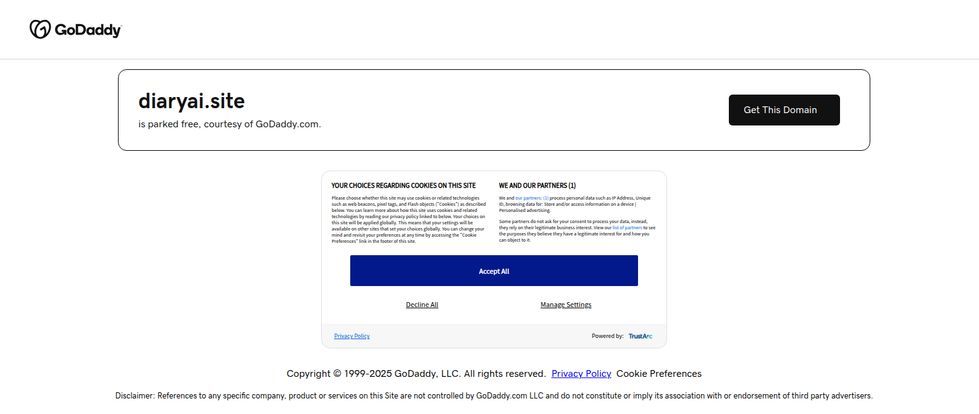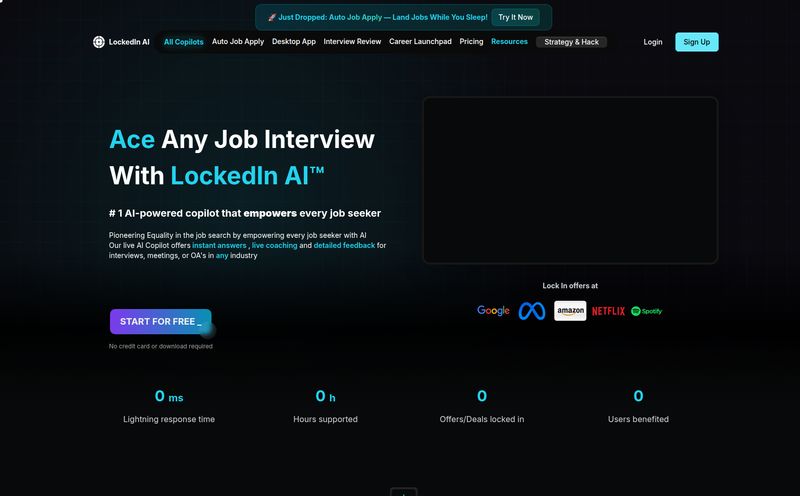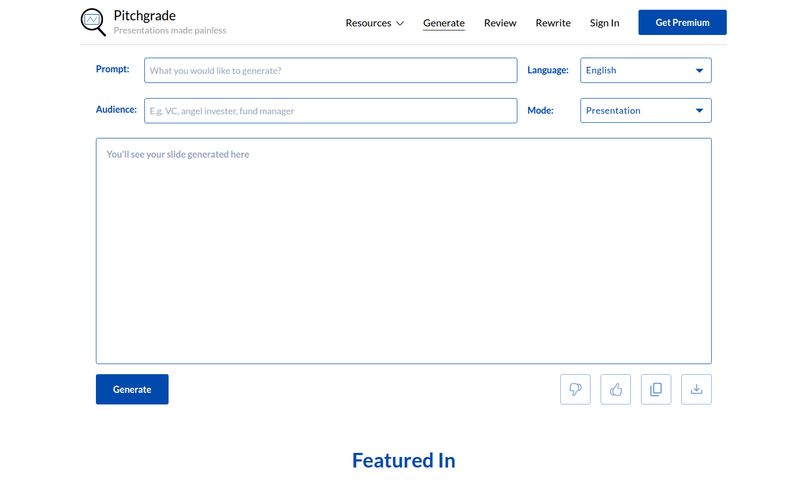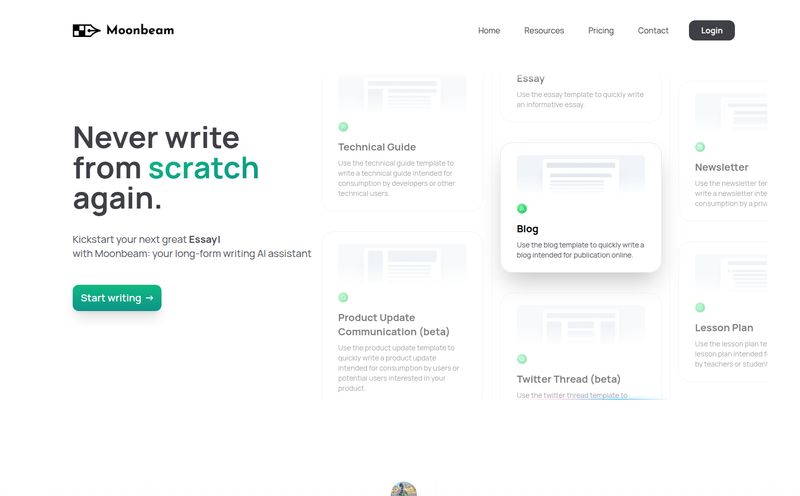I spend my days eyeballs-deep in SERPs, traffic analytics, and the ever-shifting sands of Google's algorithms. It's a lot. My brain, by the end of the day, feels like a browser with 100 tabs open, half of them playing different YouTube videos. For years, I've tried to keep a journal to sort through the chaos. I’ve used fancy Moleskine notebooks, minimalist apps, even sprawling Notion databases. The result is always the same: a few days of frantic writing, followed by weeks of guilt-ridden silence.
The friction of it all... finding the time, opening the app, typing out my tangled thoughts. It's just one more task. So when I stumbled across a mention of something called Diary AI, my professional curiosity and personal desperation were instantly piqued.
But here's the funny part. When I went to check out the site, diaryai.site, I was greeted by… a GoDaddy parked domain page. Not exactly a grand entrance, right? But honestly, that made me even more interested. It felt like I'd found a secret before it was meant to be found. A tool that promises to turn your voice directly into journal entries. A personal assistant for your thoughts. Wild.

Visit Diary AI
So, What Exactly is Diary AI Supposed to Be?
Scraping together the early info, Diary AI isn't just another note-taking app. It’s being billed as an intelligent journal diary software. The big hook, the main event, is its voice-to-text capability. The whole idea, which apparently started cooking in 2024, is to make journaling as natural as talking. You speak, it types. Simple as that.
Think about it. How many brilliant ideas have you had in the car, on a walk, or in the shower, only to have them evaporate by the time you found a pen? Typing out your feelings can sometimes filter them, but speaking them… that’s raw, that’s immediate. It’s like having a ghostwriter for your own brain. This tool aims to be that personal journal assistant, capturing your musings, your frustrations, and your flashes of genius without you ever having to touch a keyboard.
The Allure of Frictionless Journaling
As someone who lives and breathes digital efficiency, the concept of voice journaling is incredibly appealing. We've seen voice tech mature with assistants like Siri and Alexa, and transcription services like Otter.ai are a godsend for meetings. But a tool designed specifically for the intimate, often messy, act of journaling? That feels different.
I’ve always felt that the act of writing, while meditative for some, can be a barrier for others. It formalizes the thought process. Sometimes you don’t want formal. You want a chaotic, stream-of-consciousness brain dump. Voice is perfect for that. It captures the ‘ums,’ the pauses, the shifts in tone. I wonder if Diary AI will be able to capture that nuance, or if it's purely about transcription. Either way, removing the physical act of typing is a massive win for consistency.
Potential Game-Changing Features
From what little we know, the feature set is minimalist, which I actually appreciate. It's focused.
- Voice-to-Text Conversion: This is the core engine. The entire platform's success hinges on the quality of this transcription. If it’s as good as Google’s voice typing, we’re in business. If it’s like my car’s voice command system from 2015, well… not so much.
- A Personal Journal Assistant: This is more intriguing and a bit vague. Does this mean it can tag entries automatically based on content? Maybe detect your mood from your tone of voice? Or perhaps offer you prompts like, “You mentioned a new project yesterday, how is that going?” Now that would be next level.
The Bright Side and the Inevitable Hurdles
Let's be real, every new tool is a mix of promise and potential pitfalls. I've been in this game long enough to see countless 'revolutionary' apps crash and burn. So, I'm what you’d call cautiously optimistic.
The biggest advantage is clear: effortless capture. It’s designed for everyone, from the busy professional who wants to log daily progress to the creative spirit who needs to catch fleeting ideas. It democratizes the act of journaling, taking away the 'chore' aspect. This could genuinely help people build a consistent, healthy habit of self-reflection.
However, the cons are just as obvious, at least at this early stage. The platform will live or die by its voice recognition accuracy. We've all yelled at our phones for misunderstanding a simple request. If I'm pouring my heart out and Diary AI thinks I said "I'm feeling drenched in salad" instead of "I'm feeling stressed and sad," the whole experience falls apart. Accents, background noise, mumbling—these are huge technical mountains to climb.
And of course, there's the big one: the lack of information. This pre-launch mystery is fun for a blog post, but it's not a great marketing strategy. I hope they start sharing more details soon to build some real community buzz.
| Aspect | Traditional Journaling (Pen/Paper or Typing) | Diary AI (The Promise) |
|---|---|---|
| Effort | Requires physical effort, can feel like a task. | As simple as talking. Low friction. |
| Speed | Limited by typing or writing speed. | As fast as you can speak. |
| Context | Captures words only. | Could potentially capture tone and emotional nuance. |
| Accessibility | Can be difficult for those with physical disabilities. | Highly accessible, hands-free. |
What's the Damage? A Look at Pricing
As of right now, your guess is as good as mine. The parked domain isn't giving away any pricing secrets. Given the nature of AI tools, I'd bet on a subscription model. Maybe a free tier with a limited number of transcription minutes per month, and a premium tier for the power-journalers out there. Something in the range of $5-$10 a month seems plausible, positioning it against other productivity and wellness apps. But this is pure speculation. They could surprise us all with a one-time purchase model, though that seems less likely in today's SaaS world.
Frequently Asked Questions about Diary AI
Since official info is sparse, I'll tackle some questions I imagine are on your mind.
- 1. Is Diary AI free to use?
- There's no official pricing yet. It's likely to follow a 'freemium' model, with a free basic version and a paid subscription for advanced features and more usage.
- 2. How accurate will the voice-to-text be?
- This is the million-dollar question. Its success depends entirely on the quality of its transcription engine. We have to wait and see if it can handle different accents, paces of speech, and background noise effectively.
- 3. Who is Diary AI for?
- Based on its premise, it's for anyone who wants to journal but struggles with the act of writing. This includes busy professionals, students, writers, creators, and anyone looking for a low-effort way to practice mindfulness and self-reflection.
- 4. When is Diary AI actually launching?
- That's the mystery! With the domain still parked, a full public launch might be a ways off. The best bet is to keep an eye on the domain or search for announcements in the coming months.
- 5. How will it handle privacy?
- This is a critical point for a journaling app. A trustworthy service will need end-to-end encryption and a very clear privacy policy about how voice data is handled. This will be a major factor in its adoption.
Final Thoughts: Ready to Start Talking?
Despite the slightly comical discovery of a parked domain, I'm genuinely rooting for Diary AI. The world doesn't necessarily need another journaling app, but it could definitely use one that fundamentally changes our interaction with the process. Reducing friction is the name of the game in software, and Diary AI aims to remove the biggest friction point of all.
Will it deliver on its promise? Time will tell. But the concept is solid, the need is there, and I, for one, will be refreshing that domain page periodically, waiting for the day I can finally just talk my thoughts into existence. My messy, chaotic, 100-tabs-open brain is ready.
References and Sources
For more on the benefits of journaling and the science behind it, check out this excellent piece from the University of Rochester Medical Center:



